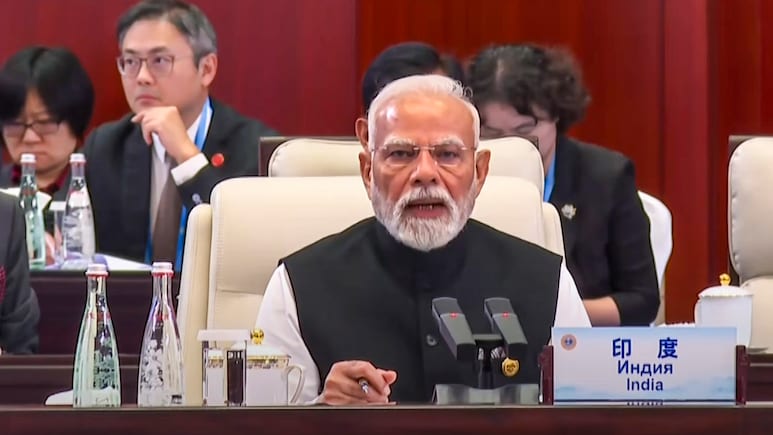
- Prime Minister Modi addressed the SCO Summit plenary session with over 20 foreign leaders present
- He criticised Pakistan for supporting terrorism, citing the Pahalgam terror attack killing 26 people
- PM Modi outlined India's SCO policy based on security, connectivity, and opportunity pillars
Prime Minister Narendra Modi on Monday addressed the Shanghai Cooperation Organisation (SCO) Summit's plenary session which included the participation of more than 20 foreign leaders and 10 heads of international organisations. During his 11-minute-long speech, PM Modi shamed Pakistan for backing terrorism and raised the April 22 terror attack in Jammu and Kashmir's Pahalgam in which 26 people were shot dead. LIVE UPDATES
Sharing my remarks during the SCO Summit in Tianjin. https://t.co/nfrigReW8M
— Narendra Modi (@narendramodi) September 1, 2025
Read the full statement here:
I am happy to be participating in the 25th SCO Summit. I express my heartfelt gratitude to President Xi Jinping for the warm welcome and hospitality extended to us. Today is the Independence Day of Uzbekistan. Yesterday was the National Day of Kyrgyzstan. On this occasion, I extend my greetings and best wishes to both leaders.
In the last 24 years, the SCO has played a very important role in connecting the extended family of the entire Eurasian region. India has always played a constructive and positive role as an active member. India's thinking and policy towards the SCO is based on three main pillars: S - Security, C - Connectivity, O - Opportunity.
With reference to the first pillar, "S for Security", I would like to say that security, peace, and stability are the basis of the development of any country. But terrorism, separatism, and extremism are big challenges in this path. Terrorism is not just a challenge to the security of a country, but a common challenge for all entire humanity. No country, no society, no citizen can consider itself safe from this. That is why India has emphasised unity in the fight against terrorism.
SCO-RATS has played a very important role in this. This year, India took the initiative to fight "Al-Qaeda" and terrorist organisations associated with it by leading the Joint Information Operation. We also proposed to increase coordination and take joint steps against radicalisation. We have raised our voice against terror financing. I express my gratitude for the support received in this.
India has been bearing the brunt of ruthless terrorism for the last four decades. So many mothers lost their children, and so many children became orphans. Recently, we saw a very disgusting form of terrorism in Pahalgam. I express my gratitude to the friendly countries that stood with us in this hour of grief. This attack was not only a blow to India's conscience, but it was an open challenge to every country, every person who believes in humanity. In such a situation, it is natural to raise the question: Can we accept the open support of terrorism by some countries?
We must clearly and unanimously say that no double standards on terrorism will be acceptable. We must jointly oppose terrorism in all its forms and colours. This is our duty towards humanity.
Now I would like to put forth my views on the second pillar, C for Connectivity. India has always believed that strong connectivity opens the doors not only to trade but also to trust and development. With this thought in mind, we are working on initiatives like Chabahar Port and the International North-South Transport Corridor. Through these, we can increase connectivity with Afghanistan and Central Asia. We believe that sovereignty and territorial integrity must be respected in every connectivity effort. This is also enshrined in the basic principles of the SCO Charter.
Connectivity, that by-passes sovereignty, loses trust and meaning.
The third pillar is: O for Opportunity. Opportunity for Cooperation and Reform.
In 2023, during India's presidency, new energy and ideas were infused. New topics like start-ups and innovation, traditional medicine, youth empowerment, digital inclusion, and shared Buddhist heritage were added to our cooperation. Our effort was to take SCO beyond governments. Connect common people, young scientists, scholars, and start-ups as well.
To strengthen our people-to-people ties, I would like to make another suggestion today - a Civilizational Dialogue Forum should be created under the SCO. Through this, we can share our ancient civilizations, art, literature, and traditions on a global platform.
Today, India is moving forward on the basic mantra of Reform, Perform, and Transform. Be it Covid or global economic instability, we have tried to turn every challenge into an opportunity. We are constantly working on wide-ranging reforms. This is opening up new opportunities for development in the country as well as international cooperation. I invite all of you to join India's development journey.
It is a matter of happiness that SCO is also evolving according to the times. Four new centers are being established to deal with contemporary challenges like organised crime, drug trafficking, and cybersecurity. We welcome this reform-oriented mindset. SCO members can increase mutual cooperation for reforms in global institutions. On the occasion of the 80th anniversary of the United Nations, we can unanimously call for UN reform.
Keeping the aspirations of the Global South imprisoned in outdated frameworks is a grave injustice to future generations. We cannot show the multi-colored dreams of the new generation on the old black-and-white screen. The screen will have to be changed. SCO can become a guide to multilateralism and an inclusive world order. I am glad that a statement is being issued today on this important subject.
We are moving forward in coordination and cooperation with all partners. I wish all the best to the next Chairman of the SCO, the President of Kyrgyzstan, and my friend, President Japarov.
Thank you very much.
Track Latest News Live on NDTV.com and get news updates from India and around the world

